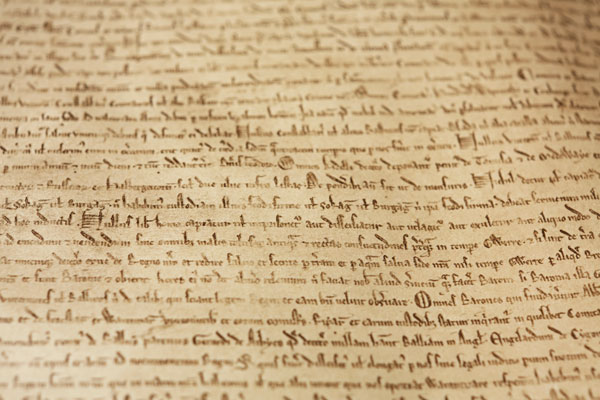This year’s theme is Democracy, Liberty and Human Rights. 2015 marks the 800th anniversary of Magna Carta. It was authenticated on June 19th 1215 at Runnymede by the Great Seal of King John.
Magna Carta (meaning ‘Great Charter’) is often seen as the foundation of democracy in England. It was the first formal document stating that a King had to follow the laws of the land. It meant that the people of England could limit the power of a King, if he was doing things that were not good for the country.
It also guaranteed the rights of individuals. People could no longer be arrested, imprisoned or have their possessions taken away except by the judgement of their equals and/or the law of the land. This was the start of trial by jury.
Magna Carta contained 63 clauses when it was first granted but only three of those clauses remain part of English law. One defends the liberties and rights of the English Church, another confirms the liberties and customs of London and other towns, but the third is the most famous:
“No free man shall be seized or imprisoned, or stripped of his rights or possessions, or outlawed or exiled, or deprived of his standing in any other way, nor will we proceed with force against him, or send others to do so, except by the lawful judgement of his equals or by the law of the land. To no one will we sell, to no one deny or delay right or justice.”
Where can you see it?
Four copies of Magna Carta still survive: one in Lincoln, one in Salisbury Cathedral and two at the British Library.
Useful links
- BBC Primary history – quiz, fun facts and simple summary
- BBC History Magazine – facts about Magna Carta
- British LibraryBritish Library – information about Magna Carta
- Amnesty International
- British Institute of Human Rights
- Commission for Equality and Human Rights
- Liberty
- Migration Watch
- OpenDemocracy
- Forced marriage and honour killing
- Stricly Democracy
Ideas for discussion
- Human Rights Act 1998
- European Convention on Human Rights
- Charter 88
- Modern slavery
- Trafficking
- Human rights in a time of terror
- Public support for terror measures
- Torture: myths and facts
- UN Convention on the Rights of the Child
- Child labour
- Child soldiers
- Smacking
Photo by courtesy of the British Library

